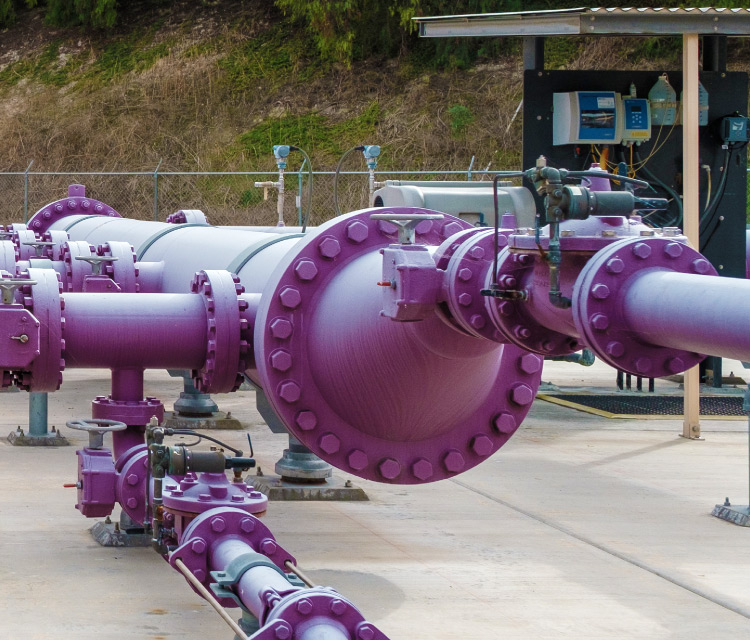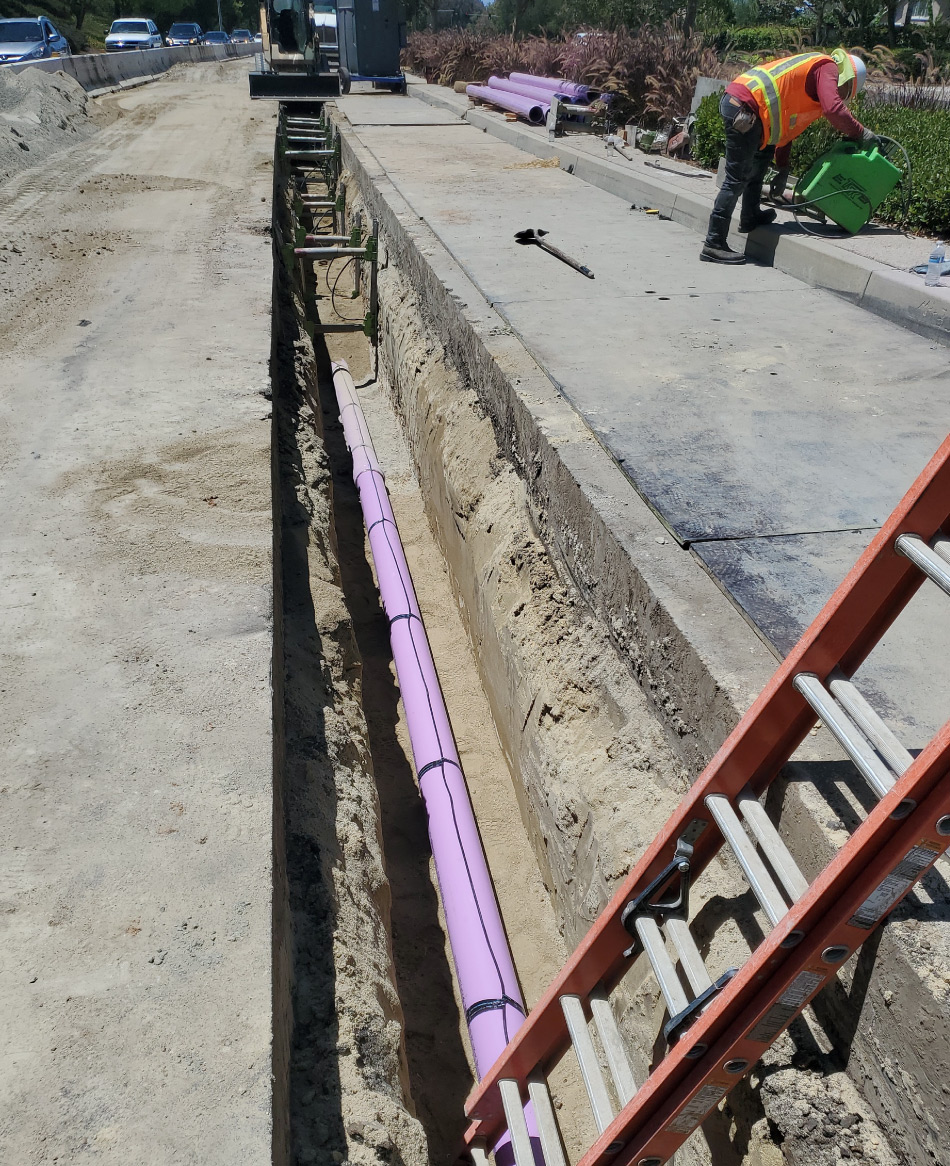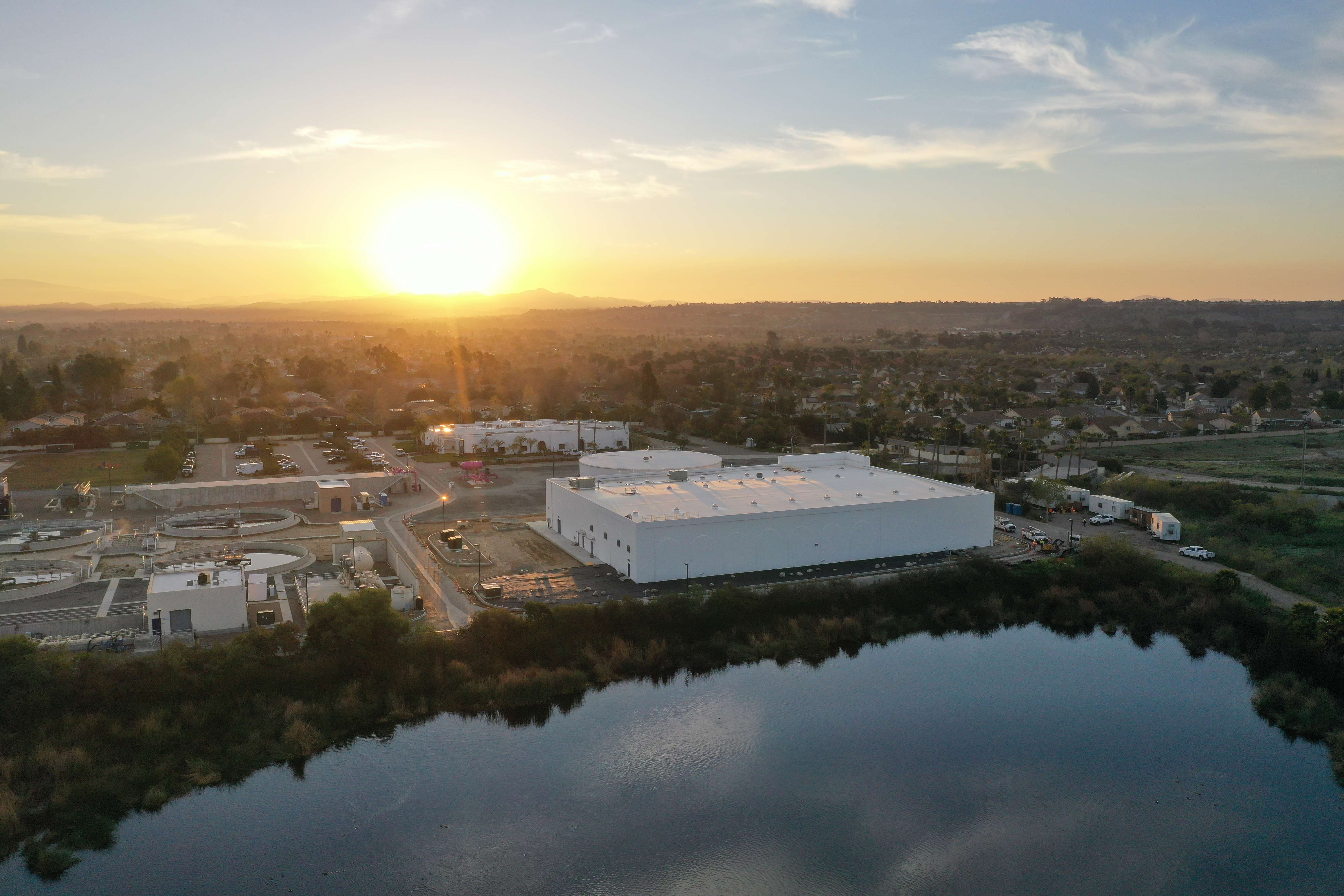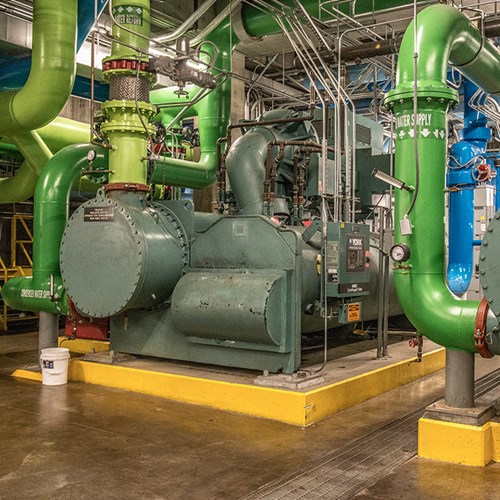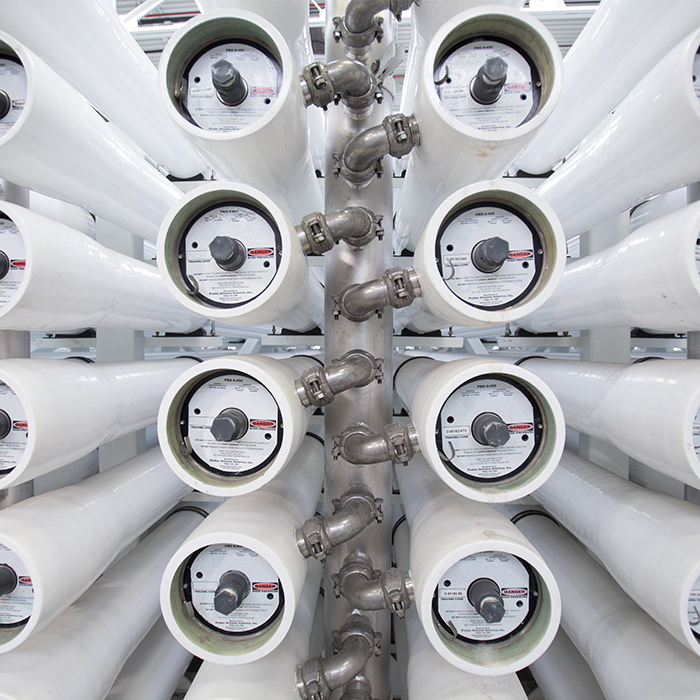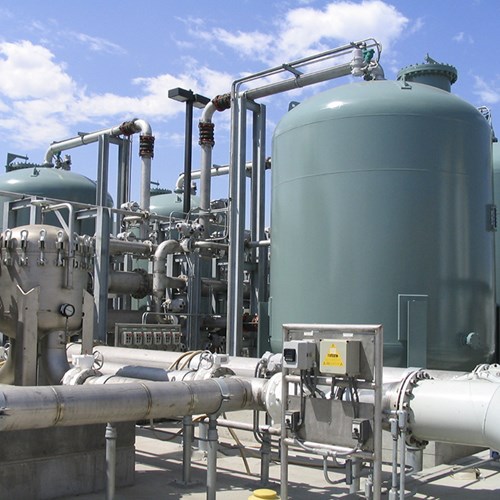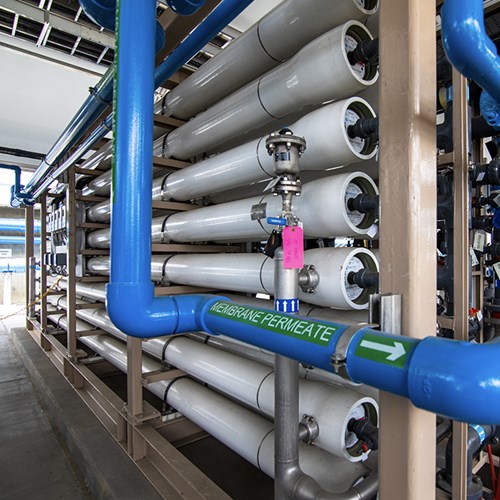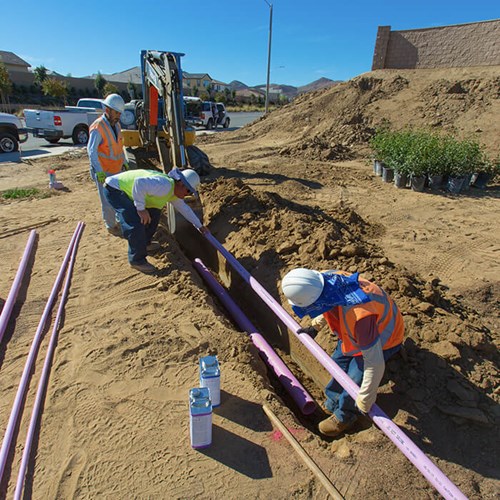Find a Document
Building Local Supplies
Think Regional, Act Local
Metropolitan was born out of the need to import water from hundreds of miles away to support a growing region. But as Southern California has evolved, so too has Metropolitan. Today, we are far more than just water importers. We are builders and planners, making large-scale investments in local supplies to complement our imported supplies. Our support of conservation, water-use efficiencies and diverse local resource programs like water recycling, desalination, groundwater recovery and storage have provided close to over 78 million acre-feet to the region’s resource mix, greatly increasing our resiliency and reliability. And we’ve only just begun. Metropolitan is in the process of developing what could be the largest water recycling facility in the world – Pure Water Southern California.
It’s not an either-or situation -- we’re developing local resources and shoring up our imported supplies. Each piece of our supply portfolio depends on the other. One insures us against the other’s vulnerabilities. When imports are challenged by drought cycles or natural disasters, local resources and conservation programs can help meet regional demands. In turn, high-quality imported supplies are necessary for recycling and groundwater replenishment programs. Working together, these sources provide Southern California with reliable water. Having access to a mix of water resources has protected the region from the impacts of drought cycles, climate change and extreme weather.
Local Supplies for Regional Reliability
When a local supply is developed -- whether it is in Ventura, San Diego, or any community in between -- all Southern California benefits. Our regional cooperation and interdependence mean one community’s recycling or groundwater cleanup project decreases the burden on Metropolitan’s imported supplies as a whole. That reduces operating costs, frees up conveyance capacity to benefit all system users and helps the region adapt to climate change. That is why Metropolitan supports and incentivizes several beneficial programs and initiatives that help the region develop local supplies and conserve. We have invested $1.6 billion in these programs to date. For a rundown synopsis of achievements, click here and for the full Achievement Report in Conservation, Recycling and Groundwater Recharge click here.
Metropolitan’s Local Resources Program provides incentives for member and local agencies to develop new local projects, such as water recycling and groundwater recovery. Metropolitan has provided financial assistance to more than 100 projects across Southern California, producing over 1.3 trillion gallons of recycled water and recovered groundwater. The value of regional reliability is elevated today in the face of critical shortages in the two main sources of imported water supplies. By providing direct funding based on how much water projects produce, the program has significantly increased their economic viability.
The numbers tell a success story. In the 1990s, nearly 60 percent of Metropolitan’s supply portfolio was water imported from the Colorado River and the State Water Project. The balance was from local resources. A shift in the supply paradigm model shows a 2035 mix of about 36 percent imported supply and 64 percent local resources.

Ensuring reliable water for Southern California requires investing in local water supplies from diverse sources along with widespread conservation.

Recycled Water
Metropolitan has historically supported recycled water projects developed by others through our Local Resources Program. But with hotter temperatures and drier conditions predicted due to climate change, we’re investing in new and innovative ways to protect and maximize our water. Metropolitan is partnering with the Los Angeles County Sanitation Districts to develop Pure Water Southern California, a recycled water project that will produce up to 150 million gallons of water daily – enough water for about 500,000 homes. The program is currently operating a 500,000-gallon-per-day demonstration facility to verify its innovative processes, which could improve efficiencies and reduce costs in water recycling. A fully realized project would be a new source of water for up to 15 million people.
Learn more about Pure Water Southern California
To further support local supplies, Metropolitan’s board approved a $3 million annual budget for the On-site Retrofit Program, providing financial incentives for the conversion of potable irrigation and industrial systems to recycled water. Incentives can help cover the costs of project design, permitting, construction costs associated with the retrofit, connection fees, and required recycled water signage. To date, the program has funded 463 project sites.
Read more about Metropolitan' On-Site Retrofit Program.
New Groundwater Treatment & Recycled Water Program Expansion
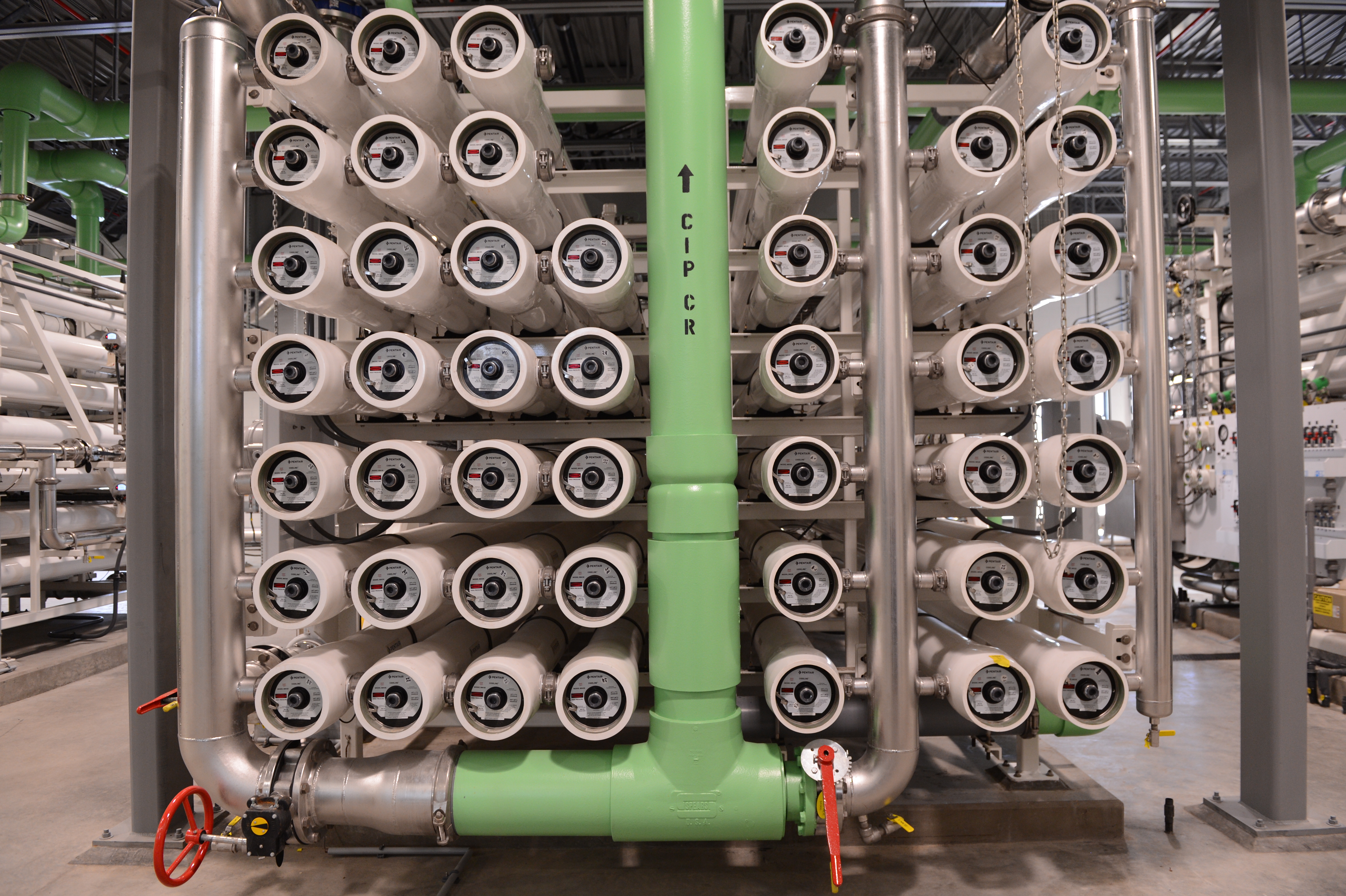
Perris II Desalter: A reverse osmosis desalter plant, pump station, operations building, and several new wells were constructed as part of this Eastern Municipal Water District project, along with nearly 70,000 feet of pipeline.
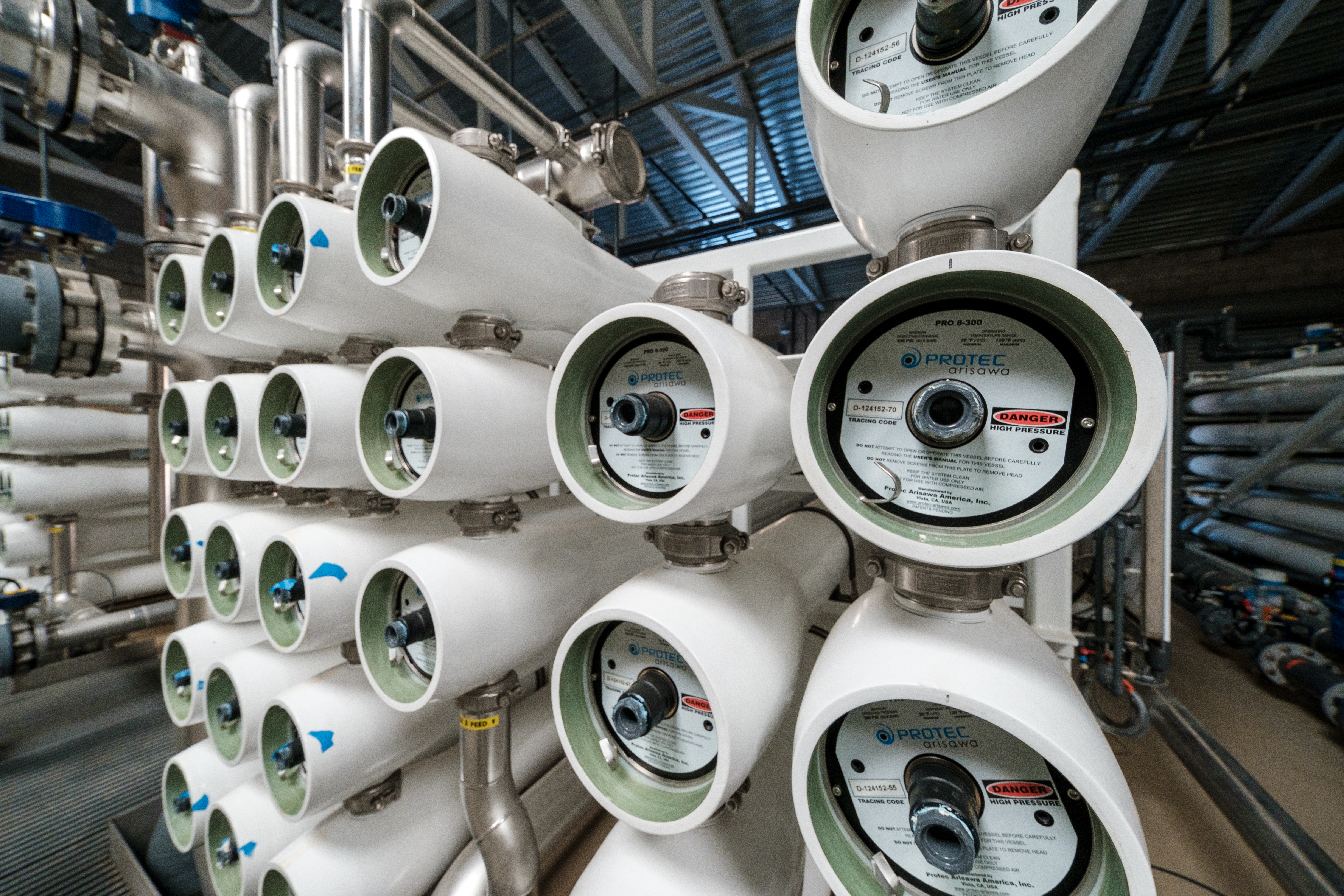
Fallbrook Groundwater Desalter: A new groundwater treatment plant, pipeline and pump station upgrades were completed as part of this San Diego County Water Authority member agency project.
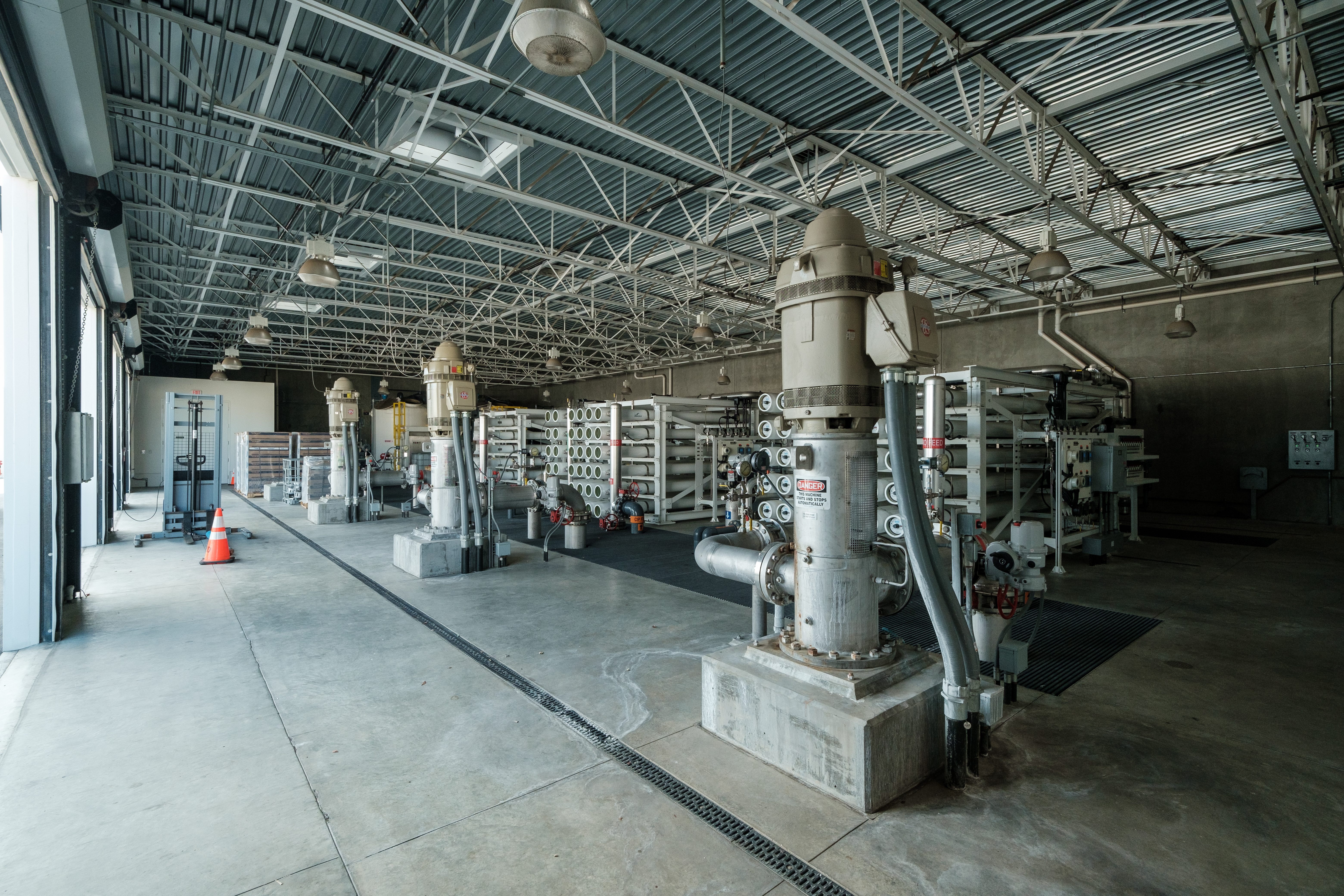
Irvine Ranch Water District Wells 21 and 22: Two new groundwater wells were constructed along with conveyance infrastructure and treatment facilities to carry water for municipal use as part of a Municipal Water District of Orange County member agency project.
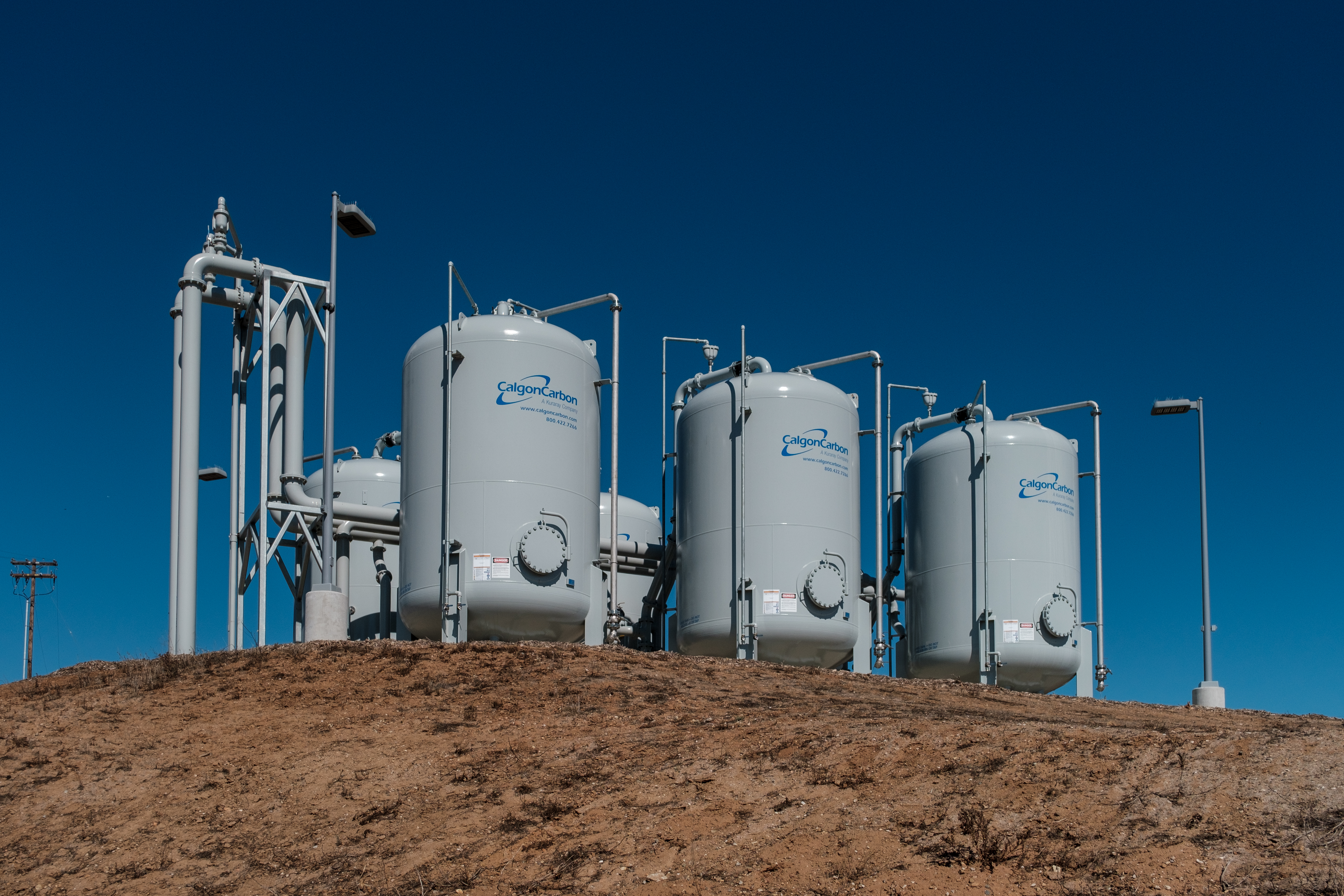
El Toro Water District Phase 11 Recycled Water Expansion: This project expanded an existing recycled water pipeline distribution system as part of a Municipal Water District of Orange County member agency project.

Groundwater Replenishment & Recovery
Groundwater provides more than 35 percent of Southern California's drinking water, making replenishment and storage programs critically important. Groundwater basins act as storage reservoirs below the surface of the earth. Although Metropolitan does not own or manage groundwater basins in Southern California, we play a critical role as the region's supplemental water supplier. We help replenish the basins and financially support groundwater recovery projects that treat groundwater.
Groundwater wells sometime become unusable because of contamination or increased salinity. This leaves water agencies with a choice – they can rely more heavily on imported supplies as a replacement, or they can recover the groundwater by building treatment facilities to remove contaminants or salt. By supporting groundwater recovery and replenishment programs, Metropolitan supports the effort to replenish the region’s natural storage reserves.
Metropolitan also works with local agencies to store imported surface water in groundwater basins for use in times of shortage through conjunctive-use and cyclic storage agreements. These agreements create flexible ways to manage water resource with member agencies and allow Metropolitan to deliver water into groundwater basins ahead of agency demands and later call on these supplies when needed. Other management tools include water exchanges and transfer programs that help ensure future water supplies for the region.

Conservation
Over the past 40 years, Metropolitan has driven innovation, evolved markets and influenced consumer decision-making to make Southern California more water efficient. Catalysts such as direct rebates, outreach and education, new technology support, advocacy for new building codes and standards, and development of strategic alliances have contributed to positive and lasting change.
Since 2009, Metropolitan and local water agencies have maintained a Long-Term Conservation Plan that supports state legislation aimed at reducing water use. Southern California met the plan’s goal of reducing per capita water consumption by 20 percent by 2020. The lasting changes are clear today – consumers’ values, behaviors and preferences for water-efficient devices have led to significant reductions in water consumption.
Numbers speak to the success of the region’s conservation. Since 1990, consumers have reduced their use of water from 220 gallons per person per day to 126 gallons in 2022. This 38 percent reduction is directly attributed to investments in conservation programs, behavioral change and legislation that supports efficient water use.
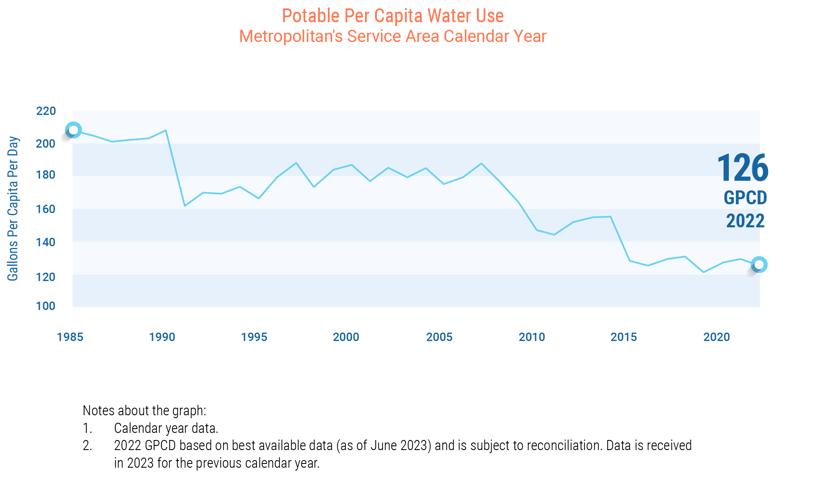
Residential & Commercial Rebates
The gateway to more efficient use of water is bewaterwise.com – Metropolitan’s conservation portal for tips and rebates. Metropolitan’s regional rebate program for both residents and businesses is administered through SoCalWater$mart. Visit bewaterwise.com and SoCalWater$mart to learn more about Metropolitan’s residential and commercial rebate programs, incentives and other conservation programs.
Supporting Innovation
Metropolitan also encourages innovation in conservation through a number of incentive programs. Click here to learn more about these programs.
Partnerships with like-minded resource agencies also spur conservation savings in communities. For example, Metropolitan works with SoCalGas on a joint water and energy efficiency incentive program that provides high efficiency products like high-efficiency clothes washers, smart irrigation controllers and low-flow showerheads to income-qualified homeowners and residents in underserved communities at no cost, while offering free installation as well.
Water Savings Incentive Program
We also support innovative conservation efforts in business with research partnerships and programs like the Water Savings Incentive Program. This regional pay-for-performance initiative is available to all commercial, industrial, institutional, agricultural and large landscape consumers with qualifying projects that focus on water-use efficiency within Metropolitan’s service area.
Innovative Conservation Program
The Innovative Conservation Program offers competitive grant funding to evaluate water savings and reliability of devices, technologies and strategies. More detailed information about these funding programs is available here.
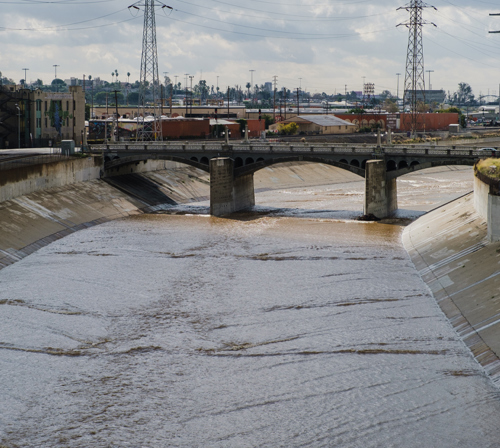
An unusual rushing LA River.
Stormwater
Each year, about 1.1 million acre-feet of rainfall and stormwater flows are captured and recharged into local groundwater basins. As drought conditions continue and climate change continues to take hold, there is a growing interest in developing additional water supply through stormwater capture and use. In response, Metropolitan launched two pilot programs to better understand the costs and benefits of stormwater capture, yield and use in 2020. One program looks at opportunities to capture additional stormwater for direct use. The other explores additional stormwater capture for groundwater recharge. Together, Metropolitan has committed $12.5 million to these programs. The data collected will help us evaluate the water supply benefits of stormwater capture and provide the framework for future funding strategies.
Future Supply Actions
Metropolitan also is investing in research to develop future local water supplies through innovative approaches. Through the Future Supply Actions Funding Program, Metropolitan co-funds member agency pilot projects and technical studies aimed at increasing the potential of recycled water, stormwater, groundwater and seawater desalination. Metropolitan has so far invested $6.5 million in more than two dozen studies. Program goals include:
- Reducing barriers to future resource production
- Providing results that are unique, yet transferable
- Advancing the field of knowledge
- Targeting critical paths to water resource implementation
Since the initial round of funding in 2013, Metropolitan has co-funded 34 pilot tests, demonstration studies and white papers. Study reports are available here.
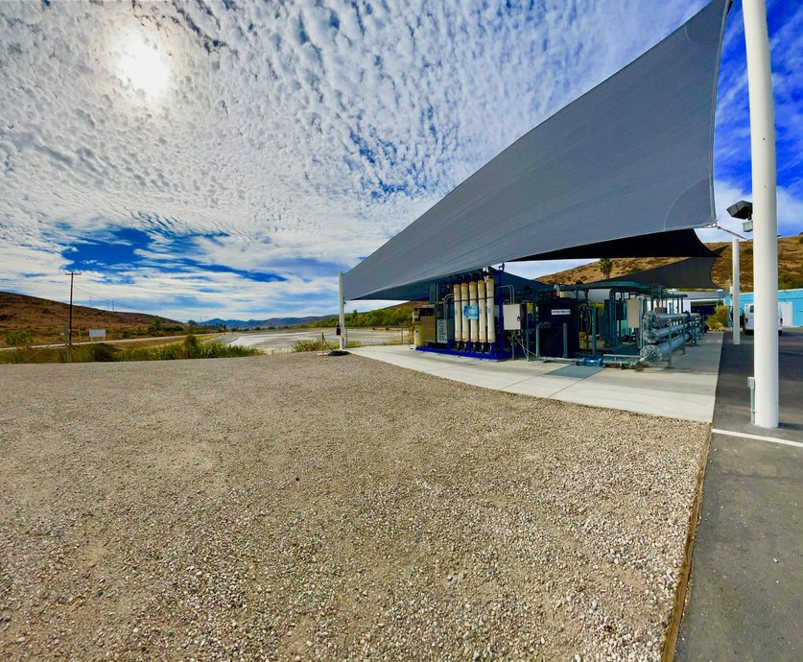
A feasibility study examines cost-effective disinfection treatment to meet advanced water treatment regulations undertaken by the San Diego County Water Authority and subagency Padre Dam Municipal Water District.
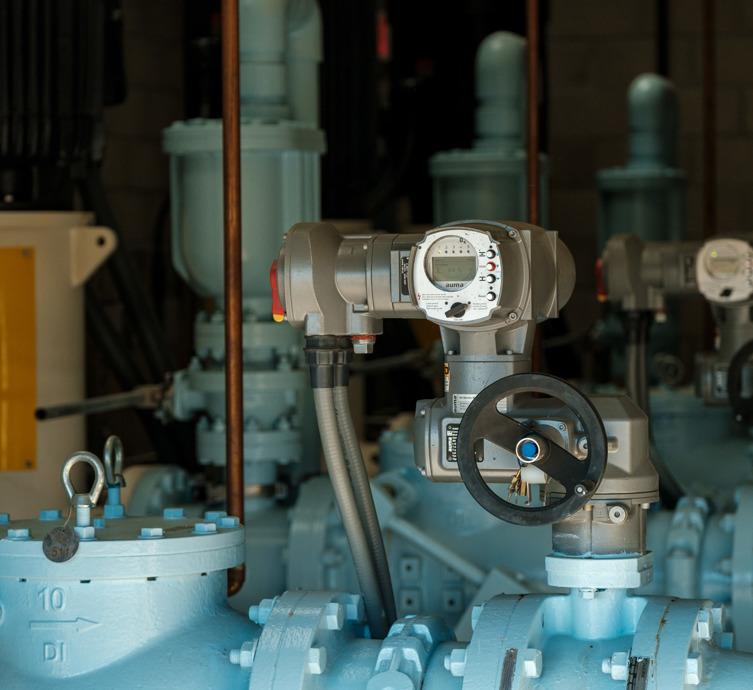
Detail photo from the Fallbrook Groundwater Desalter Project.
Desalination
Metropolitan has explored seawater desalination as a potential new supply since the 1960s, and we even developed and piloted our own thermal distillation technology.
While desalination technology has been used to treat and recover brackish groundwater for decades, the cost of treating seawater was not historically competitive with other resources. In the past 10 years, rapid improvements in membrane performance, energy recovery technology and process design have lowered seawater desalination costs, making it, in some cases, competitive with other new supply options.
Since 2001, Metropolitan has provided financial incentives for our member agencies to develop local seawater desalination projects, and seawater desalination became part of our Local Resources Program in 2014. Metropolitan is considering a new regional desalination facility as a possible addition to its drought action portfolio of projects.


